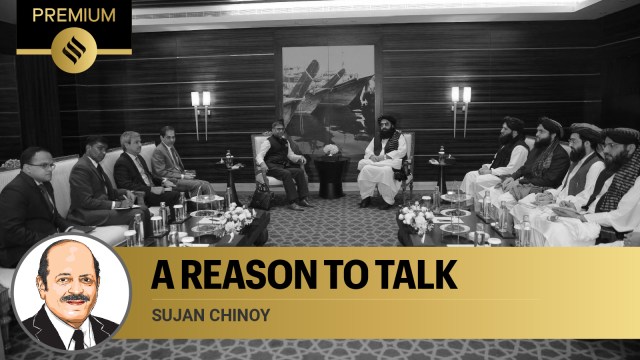
Indian Foreign Secretary Vikram Misri’s meeting with the Taliban’s acting foreign minister Amir Khan Muttaqi in Dubai on January 8 is not just part of the engagement of the regime in Kabul but a significant elevation in the level of dialogue. India, like the rest of the international community, has yet to accord formal recognition to the Taliban regime which saw off US forces from Kabul in August 2021 amidst chaotic scenes reminiscent of the helicopter evacuation of thousands from Saigon in 1975, only much worse.
Since the transition in Kabul, India has kept alive channels of communication with the Taliban at the functional level. Misri’s meeting took place against the backdrop of considerable geopolitical ferment. Two days earlier, the Indian foreign ministry spokesman had roundly condemned the Pakistani airstrikes against Afghanistan that resulted in the loss of “several precious lives”, including women and children.
Pakistan’s claim that the target was the Tehrik-e-Taliban Pakistan (TTP) camps has not cut ice with Kabul, which has labelled these brazen acts as “aggression against Afghanistan”. The TTP is fighting to evict all Pakistani forces from Pashtun tribal lands across the so-called Durand Line. Mortimer Durand’s eponymous line of 1893, a colonial cartographic caper, is regarded as an “imaginary line” by the Taliban, whose sympathy for the TTP’s pan-Pashtun ambitions has set Pakistan’s teeth on edge. In February 2024, Sher Mohammad Abbas Stanikzai, Taliban’s acting deputy minister of foreign affairs, categorically stated that Afghanistan will never recognise the Durand Line. Pakistani demands for “border” crossings using consular documents have also been dismissed.
In Pakistan’s case, there are some ironies. First, Pakistan has always considered Afghanistan to be a weak and vulnerable hinterland to be exploited and dominated in order to achieve “strategic depth” against India. Now, an emboldened Taliban is threatening Pakistan’s western flank, which it has always taken for granted. According to a UN Security Council report, there are an estimated 6,000-6,500 TTP fighters waging war against Pakistan, operating from Afghanistan. The Taliban’s support for the TTP remains strong amidst mounting instances of TTP attacks against Pakistan.
Second, as the saying goes “as you sow, so shall you reap”. Pakistan has harboured many terrorist groups as part of its insidious policy towards India. It was a key progenitor of the Taliban during the Soviet occupation of Afghanistan. Now, the chickens have come home to roost. The TTP’s Pashtun nationalism haunts Islamabad.
Links between the Taliban, TTP and al-Qaeda remain resilient. The Taliban and al-Qaeda make common cause in dealing with the virulent Islamic State (Khorasan Province). Just as the Taliban’s return had proved a boost for terrorist networks, not far away, Syria has recently been overrun by the Hayat Tahrir al-Sham (HTS), still regarded by the UN and US as a terrorist organisation. The revocation of the $10 million bounty on the head of HTS leader Ahmed Hussein al-Sharaa on grounds of expediency gives rise to the question of whether there is scope for similar rehabilitation of the current regime in Afghanistan.
Top UN, US, EU, Turkish and Jordanian diplomats, as well as the foreign ministers of Germany and France, are dealing with the new regime in Damascus but not with the Taliban. This is despite the fact that the Syrian groups that have come together under the HTS umbrella have also been egregious in their violation of human rights and the treatment of minorities.
India has done well to engage the Taliban at a senior level. China and others such as Russia, Uzbekistan, Turkmenistan, Iran and Pakistan were quick to interact with Taliban 2.0 including through their local diplomatic missions. After the Taliban’s takeover, India had recalled all its personnel but later restituted its presence in Kabul by dispatching a “technical team” to its embassy in 2022.
The “Islamic Emirate of Afghanistan” yearns for recognition. The UN Credentials Committee has turned down its request for the fourth consecutive year. However, the current situation does provide an opportunity for India to deploy a new modus vivendi in its dealings with the Taliban even if international recognition, for now, remains a chimera. The Afghan cricket team’s dizzying rise has led to players like Rashid Khan being auctioned for hefty sums in the Indian Premier League (IPL). It augurs well that India has also offered to strengthen bilateral cooperation in the popular game of cricket, which is a way of reaching out to the Afghan youth.
Following the Misri-Muttaqi tête-à-tête, India has committed to “provide further material support in the first instance to the health sector and for the rehabilitation of refugees” by way of humanitarian assistance. Pakistan has expelled more than 5,00,000 refugees, creating a humanitarian crisis in Afghanistan. Given that Iran too has had border skirmishes with Pakistan on account of the latter providing sanctuaries to separatists, this is an opportune moment to work in tandem with Iran, using Chabahar Port to expand trade and send assistance to the refugees. India could benefit by involving Tehran more closely in meeting Afghanistan’s humanitarian needs. Iran still has regional sway in some quarters and has recently offered to help mediate with Yemen to secure clemency for Nimisha Priya, an Indian nurse on death row.
India has supplied essential medicines, Covid and polio vaccines, anti-tuberculosis medicines, surgical items, drug de-addiction hygiene kits, blankets, winter clothing, pesticides, stationery for students as well as large consignments of wheat to Afghanistan. In the Union Budget for 2024-25, India allocated assistance for Afghanistan to the tune of Rs 200 crore.
Keeping in mind the complex geopolitical chessboard, India should enhance humanitarian assistance and resume development projects in Afghanistan. Capitalising on traditional friendship, there is scope for Afghanistan to figure even more prominently in India’s “Act West” policy. The Taliban, after all, is here to stay.
The writer is the director general of the Manohar Parrikar Institute for Defence Studies and Analyses, New Delhi. Views are personal